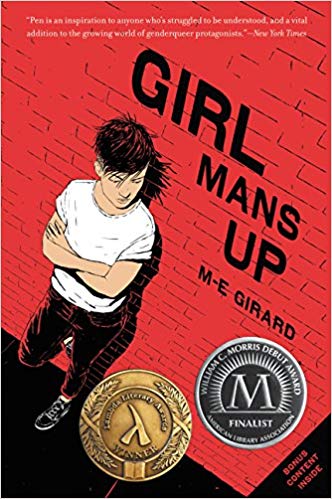 Girl Mans Up is one of the best books I’ve read in a while. This is the first gender nonconforming girl I’ve really seen in a book (I’m sure there are others, but I haven’t encountered them) and I was really excited to read Pen’s story. It reminded me in some ways of what I’m trying to do with my own book Ugly, even though Pen is different in a lot of significant ways from my protagonist.
Girl Mans Up is one of the best books I’ve read in a while. This is the first gender nonconforming girl I’ve really seen in a book (I’m sure there are others, but I haven’t encountered them) and I was really excited to read Pen’s story. It reminded me in some ways of what I’m trying to do with my own book Ugly, even though Pen is different in a lot of significant ways from my protagonist.
Penelope—Pen to everyone—Oliveira is one of the guys. Her best friends are Colby and Tristan and they’ve been friends for years. They’re all gamers and Pen’s the best among them. But there are some things that aren’t perfect—another boy named Garrett has been hanging out with them and he loves to push Pen’s buttons (and everyone else’s).
…that one over there who’s sort of a girl, I don’t know, I can’t tell anymore.
Colby and Tristan have always been fine with who Pen is, but Garrett is obsessed with the fact that she’s a girl who prefers the company of guys and doesn’t really look like a girl, except for her very long black hair, which she keeps pulled back in a pony tail all the time.
Pen explains Colby’s loyalty system to us early on. Guys have each other’s backs and all serve a role in a friendship. Pen’s primary role—other than being a gaming companion—is to get hot girls to talk to Colby. This was a little weird to me, because I didn’t see how he didn’t have enough confidence to just go up to them himself. But still, this is how he does it. He’d point to a girl he wanted and tell Pen to go work her magic. Said magic is effectively manipulating the girl into trusting her—and then Colby, so he could get what he wanted. It’s awkward and Pen doesn’t realize what she’s really doing because she has really bought into the whole guy system. Colby’s a real piece of work, although it takes her a while to see it.
Pen’s got a secondary issue to deal with, too. She comes from a very traditional Portuguese family that immigrated to Canada, where she’s grown up. She has a very supportive older brother and the two of them are considered black sheep by their own parents and the rest of the family, all because Pen is not a “good girl” (i.e., a girly girl) and her brother doesn’t want to work in the factory with all the other men—they don’t have the required respeito (respect) for their elders. I love the conflict that Pen’s family provides, especially her mom, who’s pretty horrible but totally believable. Everything Pen does to be herself is interpreted as an intentional insult to her mom and family.
When Colby tries to get Pen to go after a girl who Pen herself is interested in, things go weird and different. Pen’s arc is really to learn to folly of Colby’s guy code and the value of female friendship and it takes most of the book for that to work entirely out. Along the way, she comes to understand herself better and she also learns to stand up for herself in ways she doesn’t at the beginning. At the start of the story, she’s pretty passive, despite the fact that there is a lot for her to fight against (and for).
The book is well-plotted and all the major characters are deeply drawn. It’s told in first person present tense, which makes it feel really immediate and intense throughout. It’s great. There’s lots of very colloquial (but not overly slang-y) teen speak which felt real to me:
“Dude, I’ve known these guys longer than I’ve known you, so you can suck it”
There’s also lots of interesting stuff done with the fact that the older ones among Pen’s family are not native speakers of English. Girard includes “broken” English that feels very real (and I really think not mocking). Her mom says:
“I no yell. Listen. You cut you hair, you get people laugh.”
It works well. There’s also a lot of actual Portuguese in the book, as Pen and her family speak it, even if Pen isn’t as comfortable with it as English. This is handled very effectively to give the book a particular flavor without distracting the reader.
I haven’t given much of the book away because I think you should experience it the way I did, as an unknown entity. But you should go read it—it will open your eyes to an experience that is probably different from your own (and if not, it will be refreshingly familiar and real). It’s really an excellent book. No wonder it won an award and was a finalist for another.
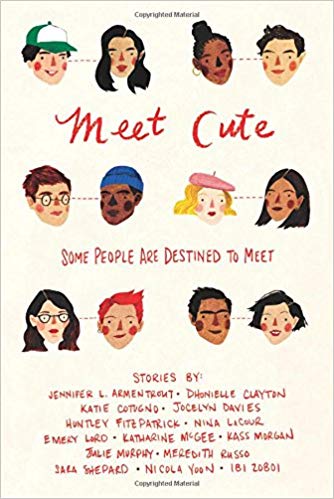 Meet Cute is a collection of “meet cute” (the first meeting of a couple who will be starring in a romance) stories by some big names in YA contemporary and romance right now. By their very nature, some of these feel a little incomplete—because these are the stories of the meet only, not the rest of the romance. There are fourteen of them and definitely some are better than others, in my view.
Meet Cute is a collection of “meet cute” (the first meeting of a couple who will be starring in a romance) stories by some big names in YA contemporary and romance right now. By their very nature, some of these feel a little incomplete—because these are the stories of the meet only, not the rest of the romance. There are fourteen of them and definitely some are better than others, in my view.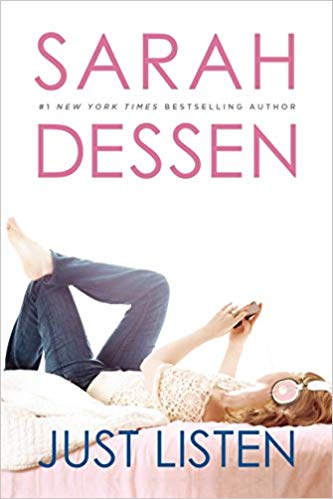 I first read Just Listen a few years ago and I loved it, mostly for Owen, the male lead. Not because he was swoonworthy or whatever in the typical sense. No, it was because he was hilarious (as was his sister and his relationship with her). Also, I could relate to him and his frustrations with Annabel (I had the same frustrations). I recently reread the novel for my MFA and found it just as good as I remembered. I was still frustrated with Annabel and glad to see her change by the end, and I was still very fond of Owen and his anger management issues (doesn’t sound particularly funny, but it’s all in the way he and his sister talk about it).
I first read Just Listen a few years ago and I loved it, mostly for Owen, the male lead. Not because he was swoonworthy or whatever in the typical sense. No, it was because he was hilarious (as was his sister and his relationship with her). Also, I could relate to him and his frustrations with Annabel (I had the same frustrations). I recently reread the novel for my MFA and found it just as good as I remembered. I was still frustrated with Annabel and glad to see her change by the end, and I was still very fond of Owen and his anger management issues (doesn’t sound particularly funny, but it’s all in the way he and his sister talk about it).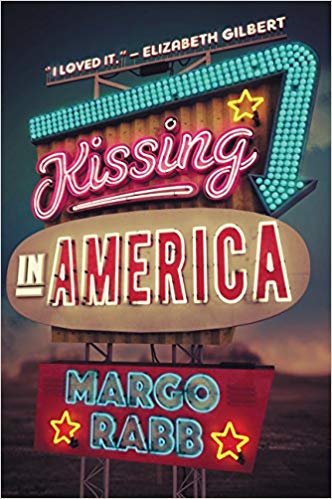 It’s not often that you get a YA novel that deals with both poetry and romance novels. Rabb does a great job with this book. It’s cute and funny even while touching on some sad subjects.
It’s not often that you get a YA novel that deals with both poetry and romance novels. Rabb does a great job with this book. It’s cute and funny even while touching on some sad subjects.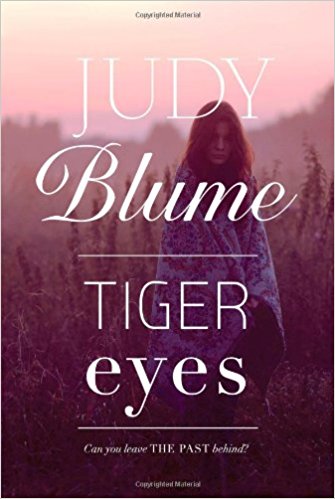 As I think I’ve mentioned earlier, I wasn’t a huge Judy Blume fan growing up, although I did read most of her stuff for younger readers. My MFA course instructor wanted me to read several of Blume’s books for this semester and Tiger Eyes was one I picked. It was first published in 1981 and I have to say it holds the test of time pretty well, with a couple exceptions I’ll mention below.
As I think I’ve mentioned earlier, I wasn’t a huge Judy Blume fan growing up, although I did read most of her stuff for younger readers. My MFA course instructor wanted me to read several of Blume’s books for this semester and Tiger Eyes was one I picked. It was first published in 1981 and I have to say it holds the test of time pretty well, with a couple exceptions I’ll mention below.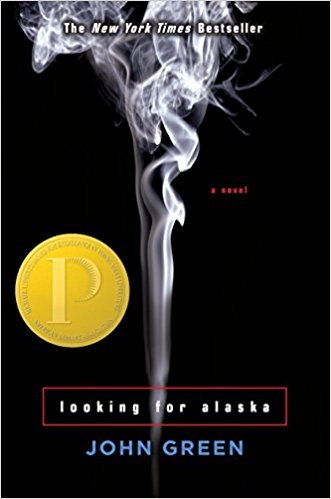 I first read Looking for Alaska two or three years ago, and reread it recently for the MFA. I enjoyed it the second time around, too. Of course, I was “reading as a writer” so the experience was a little different. Still, it’s a good story told well.
I first read Looking for Alaska two or three years ago, and reread it recently for the MFA. I enjoyed it the second time around, too. Of course, I was “reading as a writer” so the experience was a little different. Still, it’s a good story told well.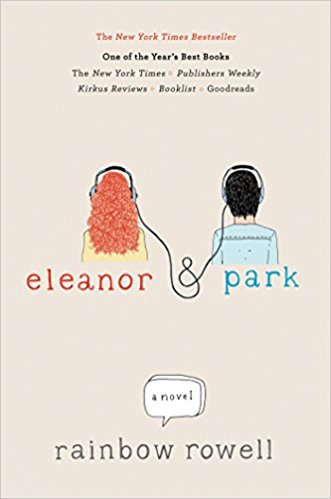 Eleanor & Park is one of my favorite books because it’s a wonderful emotional roller coaster-ride. Rowell is probably my favorite author because of what she can do with details. Who knew hand-holding could be as intense as she makes it?
Eleanor & Park is one of my favorite books because it’s a wonderful emotional roller coaster-ride. Rowell is probably my favorite author because of what she can do with details. Who knew hand-holding could be as intense as she makes it?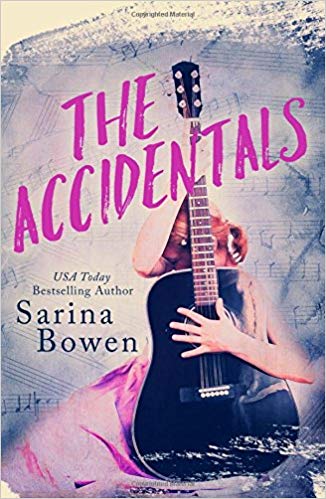 I’m a huge fan of Bowen’s adult romances, especially the True North series set in Vermont. So of course I had to check out her first YA book.
I’m a huge fan of Bowen’s adult romances, especially the True North series set in Vermont. So of course I had to check out her first YA book.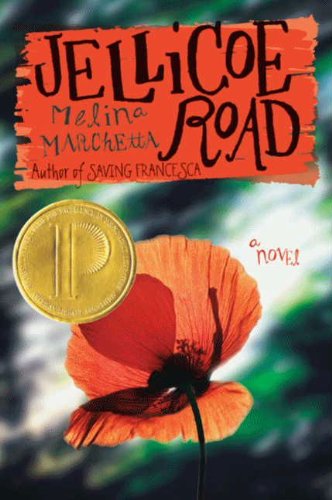 Jellicoe Road is a layered contemporary with a carefully-woven-in mystery. It’s beautifully written. But I have to admit, it’s also just the kind of book that makes me feel a little dumb, because I regularly felt like I didn’t fully understand everything that was going on (especially in the beginning). This can happen with complex books—I am often a lazy reader and don’t always pick up on very subtle nuances, which abound in this book. Still, that doesn’t make it a bad book and I did enjoy it (things made sense for me by the end).
Jellicoe Road is a layered contemporary with a carefully-woven-in mystery. It’s beautifully written. But I have to admit, it’s also just the kind of book that makes me feel a little dumb, because I regularly felt like I didn’t fully understand everything that was going on (especially in the beginning). This can happen with complex books—I am often a lazy reader and don’t always pick up on very subtle nuances, which abound in this book. Still, that doesn’t make it a bad book and I did enjoy it (things made sense for me by the end).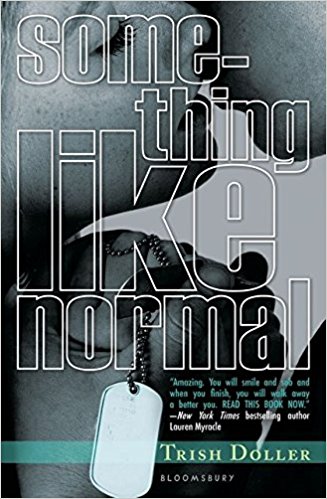 Something Like Normal is a slim book that explores a few weeks in the life of Travis Stephenson, a 19-year-old Marine home on leave after a tour in Afghanistan. His best friend there was recently killed and Travis is having apparent PTSD symptoms even though it’s undiagnosed because he’s afraid to seek help. He has nightmares and keeps thinking he’s seeing his dead friend. This definitely makes for a good story. And I did enjoy it, even though there were some things that bugged me about it.
Something Like Normal is a slim book that explores a few weeks in the life of Travis Stephenson, a 19-year-old Marine home on leave after a tour in Afghanistan. His best friend there was recently killed and Travis is having apparent PTSD symptoms even though it’s undiagnosed because he’s afraid to seek help. He has nightmares and keeps thinking he’s seeing his dead friend. This definitely makes for a good story. And I did enjoy it, even though there were some things that bugged me about it. There’s good reason this is a well-known and well-respected book. Woodson has done a great job with a tough subject, written 16 years ago—long before the publishing world started earnestly trying to make up for its lack of diversity.
There’s good reason this is a well-known and well-respected book. Woodson has done a great job with a tough subject, written 16 years ago—long before the publishing world started earnestly trying to make up for its lack of diversity.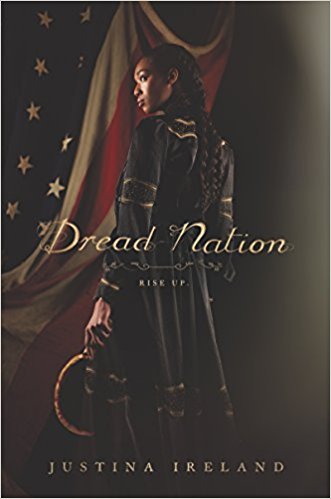 This is really a remarkable and very powerful book. First off, it’s a very engaging and exciting story with some action. You’ve got the Civil War setting and you’ve got zombies. I’m pretty sure that Civil War era isn’t a common setting in YA historical fiction, so that’s a nice thing right there. But Ireland has really twisted that setting with her introduction of zombies, or shamblers as they call them in the book (which is, by the way, an awesome term).
This is really a remarkable and very powerful book. First off, it’s a very engaging and exciting story with some action. You’ve got the Civil War setting and you’ve got zombies. I’m pretty sure that Civil War era isn’t a common setting in YA historical fiction, so that’s a nice thing right there. But Ireland has really twisted that setting with her introduction of zombies, or shamblers as they call them in the book (which is, by the way, an awesome term). For full disclosure, this author is going to be my faculty mentor for the first semester of my MFA, which is why I picked up her books. However, I haven’t met her yet so I figured I can still be trusted with a review.
For full disclosure, this author is going to be my faculty mentor for the first semester of my MFA, which is why I picked up her books. However, I haven’t met her yet so I figured I can still be trusted with a review.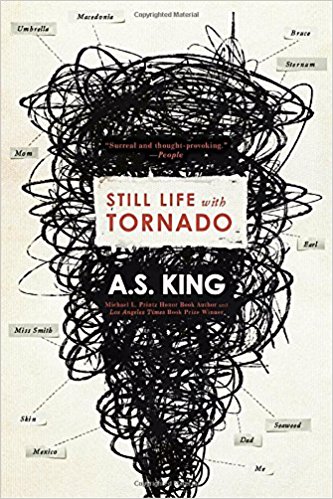 King loves to work with weird ideas, and this book is no exception. At the beginning of the book, all we know about Sarah is that something happened at school that has her unwilling to go anymore. She was a talented artist but whatever happened seemed to suck her ability to draw right out of her fingers. She wanders Philadelphia by bus and ponders how literally nothing is original. Nothing she does, nothing anybody else does, nothing. She’s depressed and having an existential crisis.
King loves to work with weird ideas, and this book is no exception. At the beginning of the book, all we know about Sarah is that something happened at school that has her unwilling to go anymore. She was a talented artist but whatever happened seemed to suck her ability to draw right out of her fingers. She wanders Philadelphia by bus and ponders how literally nothing is original. Nothing she does, nothing anybody else does, nothing. She’s depressed and having an existential crisis.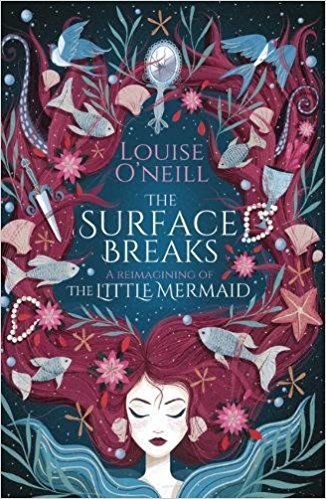 I had high expectations for The Surface Breaks because I think O’Neill is an amazing and very skilled writer. She did not let me down. This book is different from her others, as it’s a reimagining of the fairy tale The Little Mermaid.
I had high expectations for The Surface Breaks because I think O’Neill is an amazing and very skilled writer. She did not let me down. This book is different from her others, as it’s a reimagining of the fairy tale The Little Mermaid.